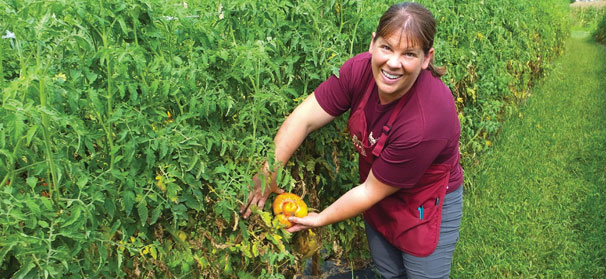

Sep 18, 2012Farmers’ markets need to sell safe food, too
Buying locally grown produce at the farmers’ market is a great way to ensure your family is getting the freshest food possible, but it doesn’t guarantee that the produce is safer. Just like any food, locally grown food must be handled safely on the farm and in the markets to make sure it is safe when it lands on the diner table.
That’s the message that University of Georgia (UGA) Extension Food Safety Specialist Judy Harrison has been sharing as she meets with farmers’ market organizers and vendors throughout Georgia.
Harrison is wrapping up a three-year, multi-state, USDA-funded project to study the food-safety practices used by growers and market managers and to create a food-safety curriculum to help teach farmers and market managers the best practices to keep food safe.
“We are trying to get them to focus on good, common-sense food safety practices,” Harrison said.
The curriculum she produced, with the help of Julia Gaskin, sustainable agriculture coordinator for the UGA College of Agricultural and Environmental Sciences, and Extension specialists from Virginia and South Carolina, offers farmers and market managers checklists so they can evaluate their own farms and markets. It also includes a correlating series of fact sheets that that will provide them with more information on the best way to tackle particular food safety issues.
The program – being used by a group of county Extension agents in all three states – has two goals: Keep consumers safe and help protect Georgia’s burgeoning local-food movement from suffering the crippling effects of a health scare.
“Food safety is just good marketing,” Harrison said. “Even if your product is not involved in an outbreak, your sales still can be affected … It only takes one scare to ruin the market.”
She pointed out an E.coli O157:H7 outbreak in 2006 that was traced back to a specific California spinach field. Despite the fact that the E.coli outbreak was traced back to only one of the many spinach fields in California, it took several months for the sales of baby spinach to return to normal levels.
The same thing could happen to Georgia’s growing farmers’ market scene if even one outbreak was linked back to a vendor, Harrison said.
Not to mention that even the most well-meaning farmer can be held liable if someone gets seriously ill from his or her produce, and one lawsuit can quickly shut down a small farming operation.
“People just don’t think about some of the issues,” Harrison said. “But we know there can be food safety issues with locally grown food, just like there can be problems with food that is shipped here from other places if the food is handled in a way that contamination occurs.”
Some basic practices Harrison advocates are: Testing the irrigation well or pond water that farmers use for disease-causing bacteria, properly composting manure, following National Organic Program guidelines for appropriate waiting periods between raw manure application and harvesting, keeping animals out of growing areas, using water that is safe for drinking to wash produce, and keeping produce cool after it’s harvested.
For farmers’ market managers, Harrison recommends having food safety standards in place that keep pets out of the market, keep conditions in the market clean and sanitary and make sure that food displayed for sampling is handled safely.
By Merritt Melancon, University of Georgia
none














